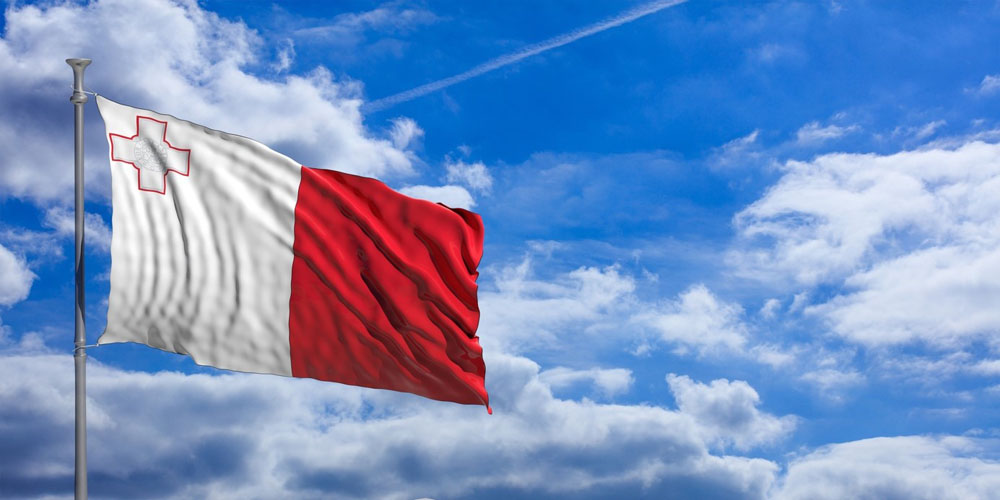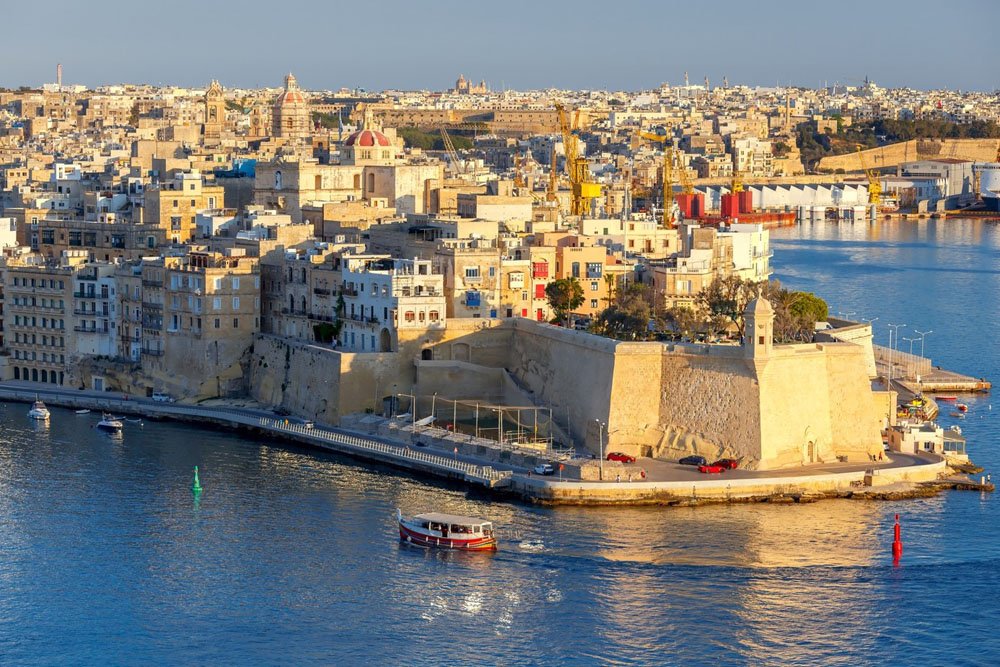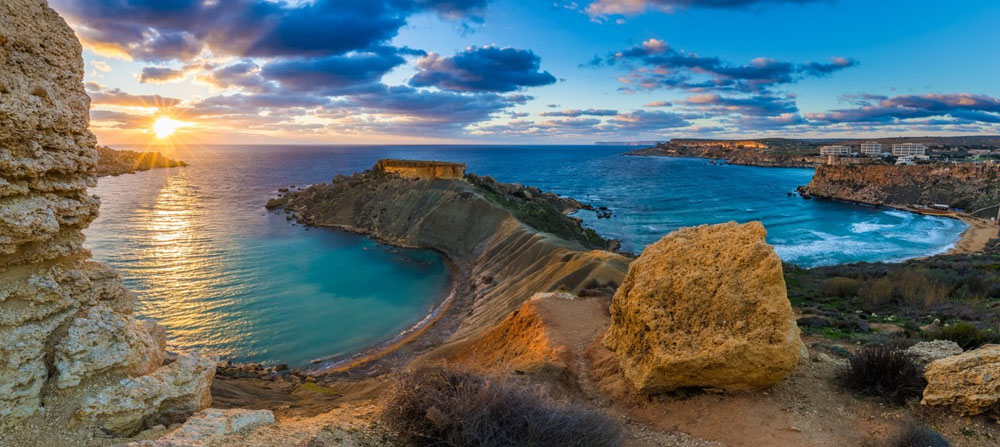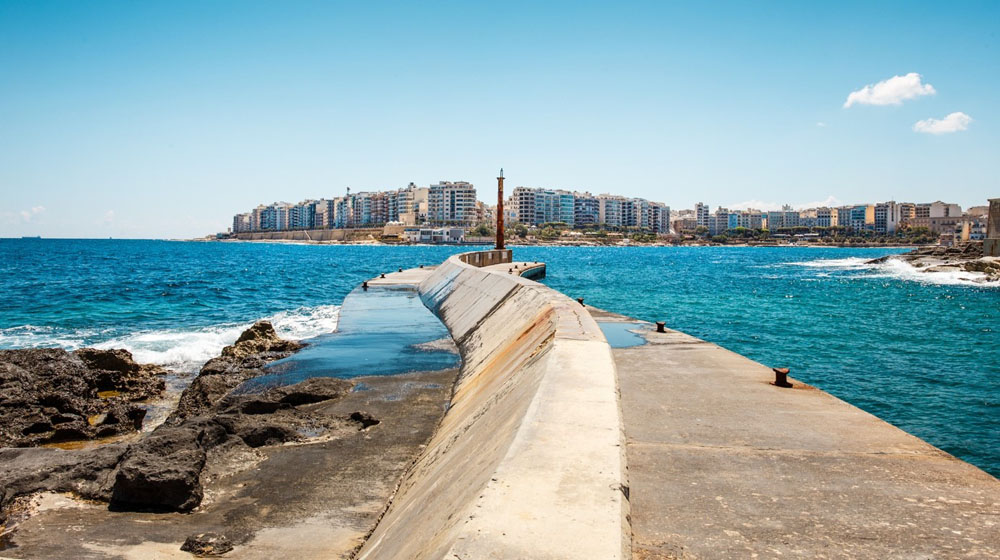Learn English in Malta

Malta may not immediately spring to mind as a destination for an English language study trip due to its geographical location in the Mediterranean, but it offers an excellent alternative to England or more distant destinations such as the USA, Australia, New Zealand or Canada within a very short distance. The three inhabited islands of Gozo, Malta and Comino (not even 10 people) are not evenly populated, with around 394,000 of the island's 430,000 inhabitants living in the metropolitan area of the capital Valletta. In addition to Maltese, English has been the national language since Malta became a British colony in 1814, although it is not usually the native language of the Maltese.
In Malta you can feel the influence of its very different rulers throughout history, who occupied the islands from all parts of the Mediterranean and beyond. Romans, Eastern Roman Byzantines, Arabs, Ostrogoths, Vandals, Normans, Habsburgs and Britons all occupied Malta and each brought their own culture with them, and Malta's proximity to Italy can also be seen and felt.
This variety of cultural assets of the country, such as the prehistoric underground temple complex Hypogeum of Tarxien, the Blue Grotto, the catacombs of Rabat, the rocky beaches of St. Georges Bay or the most beautiful beach of the islands Ramla Bay, the subtropical climate and the many hours of sunshine make Malta an extremely attractive destination for language stays and is ideal for combined language and beach vacations. Diving, windsurfing, snorkeling, hiking, climbing, swimming, sunbathing, going out - all while learning English!

Country, cities and regions
Most of the country's language schools are located on the main island of Malta, around Valetta, Sliema and San Giljan (St. Julians), but English courses are also available on the neighboring island of Gozo. If you are looking for peace and relaxation, Gozo is the right place for you. Small historic villages, rolling hills, rugged cliffs and secluded bays make Gozo so irresistible. On the other hand, those who prefer a livelier pace, are looking for a wide range of nightlife and shopping options and a varied leisure and sports program are more likely to be drawn to San Julians or Sliema, even though they are not big cities either, with just over 8,600 and 14,100 inhabitants respectively. Nevertheless, learning English and enjoying the Mediterranean can be combined really well in both towns. Although Valletta is the capital of Malta, its population is not even 6,000, despite the fact that its construction as a fortress city by the Order of Malta began in 1566. Depending on the language travel provider, other cities are also offered for a language study trip, such as St. Paul's Bay or Msida. No matter which city you choose in the Republic of Malta, you are sure to experience unforgettable weeks.

Itinerary
In just over two hours from Zurich, you can reach Malta International Airport Luqa, which is just 7 kilometers from Valletta. Even shorter language stays in Malta are therefore perfectly conceivable, although the learning effect of language courses lasting two weeks will of course be rather limited. However, as preparation for exams, as a short refresher course for work, applying for an apprenticeship or a new job, even two weeks can be a good start and can be repeated regularly.
Weather and climate
Malta is clearly chosen for its ideal beach weather. However, the subtropical climate with hot and dry summers from July to August can also make for very unpleasantly warm nights, so that learning can sometimes suffer. May, June and September are already or still warm and very pleasant with an average water temperature of 21°C in September. In principle, it never gets really cold in Malta, not even in the sea. Even in February, the water temperature is still 15°C, although this is of course only a bathing pleasure for the very hardy. Early summer and late summer are therefore the best times to travel to Malta for language study trips, allowing you to keep a cool head for your studies and still enjoy a dip in the Mediterranean.

Language schools in Malta
The choice of language courses in Malta is not to be sneezed at. Prospective language students can generally choose from standard courses and intensive courses as well as diploma courses that prepare them for various language diplomas, such as the Cambridge Certificates, IELTS, TOEFL, TOEIC or GMAT Preparation. However, it should be noted that these courses usually last a minimum of six to eight weeks and not every language school offers all language diploma preparation courses. Many language schools in Malta also offer other special courses for a language stay to learn English, such as individual lessons, vacation courses with a smaller number of lessons, combined standard courses with individual lessons, mini-groups or courses for an older target group. The number of individual lessons can vary depending on the school, which is also due to the fact that the duration of English lessons is not the same everywhere. It is therefore usually worth doing a quick check.

Entry requirements
You do not necessarily need a passport to enter Malta for your language study trip; an identity card is also accepted for the duration of a visit as a tourist of up to three months.
Security
The Department of Foreign Affairs FDFA warns on its website about the increase in snatching and pickpocketing in Malta. Young language students in particular are frequent victims of theft. It is therefore advisable to leave travel documents in the hotel safe or another safe place and only carry a copy of your identity card or passport with you. You should also leave large sums of money or credit cards in your room and not take them with you to the beach or bars.

Costs
The cost of a language study trip to Malta also depends on the type of language course you book. Intensive courses or diploma preparation courses usually cost more than standard courses, partly because the number of lessons is higher. Standard language courses with a duration of four weeks are available for as little as EUR 1,200 to 1,900, including a single room with a host family with half board. The prices for accommodation in residences, such as school hostels, are usually slightly more expensive, but usually do not include meals. Prices can also vary depending on the season and provider, so the above information is only a rough guide. You should not forget that the flight, transfer, other meals, leisure activities, nightlife, shopping and other expenses must also be included in the price. This makes a language study trip to Malta a very attractive alternative to many other destinations for English language travel - such as England, the USA, Australia or Canada.
